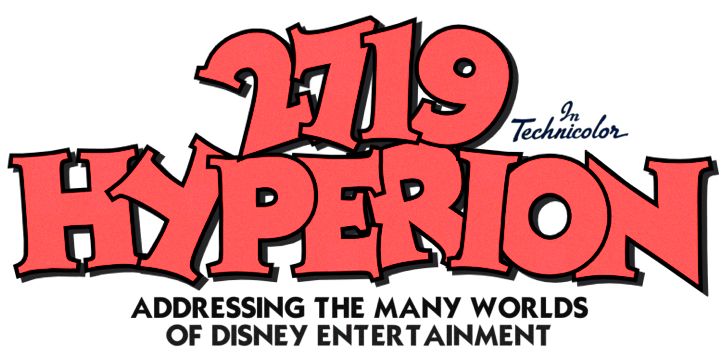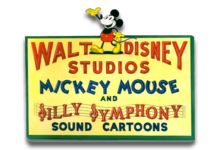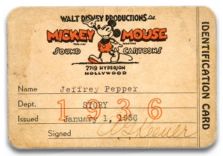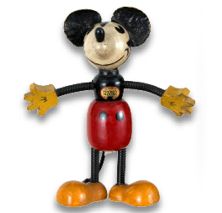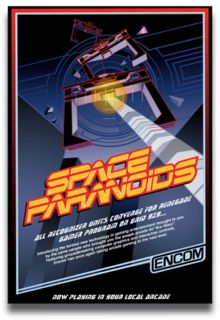The latest wave of Disney Treasures DVDs,
Disneyland: Secrets, Stories & Magic,
The Chronological Donald Volume Three and
The Adventures of Oswald the Lucky Rabbit, were released yesterday. I will leave it to others in the Disney online community to do more extended reviews of each of the volumes, especially in regard to their technical specifications and presentations; I would much rather address some of the great items included in these releases more specifically than in just the context of a general review.
While I was certainly anxious to see those early restored Oswald cartoons and also revisit Donald Duck in one of his most celebrated periods, I instead first unwrapped the Disneyland set and immediately went searching for what I consider to be the real gem of the three volumes -- the 1956 People and Places short subject
Disneyland U.S.A., restored to its original glorious wide screen Cinemascope presentation.

It is a revelation. I had previously seen a pan-and-scan version of the film about a decade ago on the Disney Channel's overnight Vault Disney programming, and to say that cropped edition did not do the film justice would be a severe understatement. For
Disneyland U.S.A.'s wide angle panoramas of the park during its earliest of days are true marvels to behold.
Having never visited Anaheim until 1989, I have always longed to get some type of visual sense of 1950s era Disneyland. It is often very difficult to ascertain size, scale, scope and placement from even the best of photographs, but it is in those areas where
Disneyland U.S.A. succeeds so dramatically. The film provides all of these perspectives almost immediately; an opening aerial flyover quickly establishes the geography of the park during those early years. In one continuous shot the camera travels counter-clockwise around the park and provides an amazing visual reference of what once was. It is breathtaking.

Before heading into the park proper, our guide and narrator, the oh-so-easy-to-listen-to Winston Hibler takes us for a quick tour of the nearby Disneyland Hotel. The brief few minutes spent there is still a revealing encapsulation of 1950s culture, from candy stores and beauty salons to shuffleboard courts and poolside fashions.
Upon arriving in Disneyland, we are taken on a leisurely land-by-land tour that alternates between the aforementioned spectacular aerial panoramas and more intimate guest's eye viewpoints. Nearly every corner of the park, no matter how remote, seems to be touched in some way by the camera's eye.

More than anything, viewing the film is most akin to watching a long challenging jigsaw puzzle being assembled before your eyes. Disparate images you may have previously seen in books, photos, other films and on television programs suddenly are brought together in context to form a greater picture of the park as it existed in 1956. One shining example of this is brought to bear through the film's overview of Frontierland. I had long wondered how all the various ride components of Nature's Wonderland coexisted; via bird's eye views and first person perspectives, we see how the mine trains, pack mules, Conestoga wagons and stagecoaches all departed the little town of Rainbow Ridge and navigated the faux-desert landscape. Vignettes in other areas of the park reveal other geographic mappings. In similar fashion, the various vehicle components associated with Storybookland in Fantasyland are also demonstrated.


What is also especially enjoyable is seeing things that were largely innocuous in 1956 that have since become iconic. Guests pay little attention as they walk past many of the now-famous attraction posters displayed near the park entrance. In another scene, a young child clutches her ticket book, which today is considered a collectors item emblematic of not only Disneyland, but to some extent, American popular culture as well.
Disneyland U.S.A. is a vibrant and extremely colorful trip back in time that simply mesmerizes. It is a 42 minute time capsule that you'll likely want to revisit again and again.
And a great compliment to
Disneyland U.S.A. are three of my favorite Disney blogs--
Daveland,
Gorillas Don't Blog and
Stuff from the Park. Their collective collections of vintage Disneyland photographs are Disney Treasures in their own rights. Just remember to come up for air every few hours or so.
 Souvenir buttons of bygone days.
Souvenir buttons of bygone days.